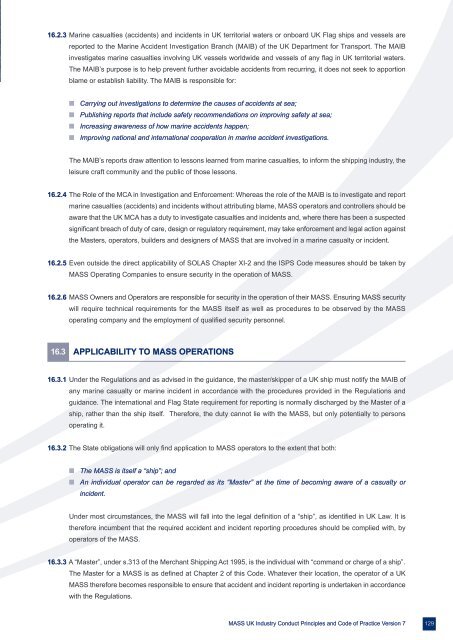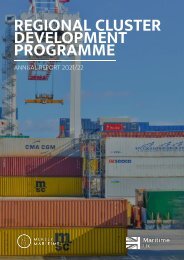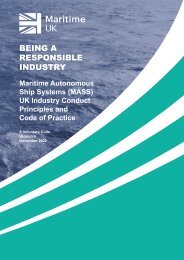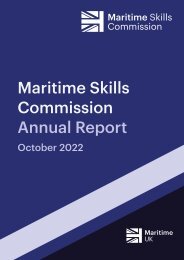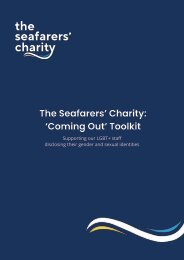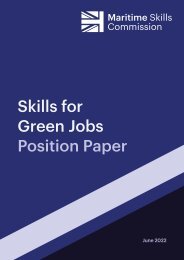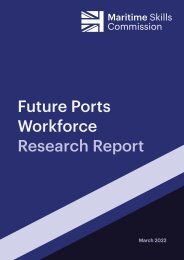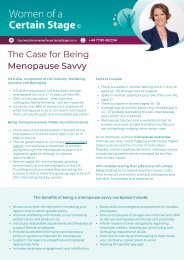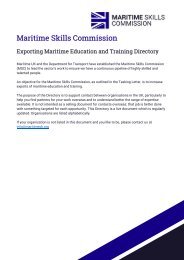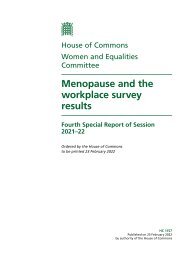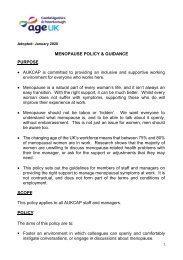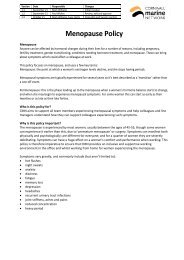COP_2023_V7_pages
You also want an ePaper? Increase the reach of your titles
YUMPU automatically turns print PDFs into web optimized ePapers that Google loves.
16.2.3 Marine casualties (accidents) and incidents in UK territorial waters or onboard UK Flag ships and vessels are<br />
reported to the Marine Accident Investigation Branch (MAIB) of the UK Department for Transport. The MAIB<br />
investigates marine casualties involving UK vessels worldwide and vessels of any flag in UK territorial waters.<br />
The MAIB’s purpose is to help prevent further avoidable accidents from recurring, it does not seek to apportion<br />
blame or establish liability. The MAIB is responsible for:<br />
n Carrying out investigations to determine the causes of accidents at sea;<br />
n Publishing reports that include safety recommendations on improving safety at sea;<br />
n Increasing awareness of how marine accidents happen;<br />
n Improving national and international cooperation in marine accident investigations.<br />
The MAIB’s reports draw attention to lessons learned from marine casualties, to inform the shipping industry, the<br />
leisure craft community and the public of those lessons.<br />
16.2.4 The Role of the MCA in Investigation and Enforcement: Whereas the role of the MAIB is to investigate and report<br />
marine casualties (accidents) and incidents without attributing blame, MASS operators and controllers should be<br />
aware that the UK MCA has a duty to investigate casualties and incidents and, where there has been a suspected<br />
significant breach of duty of care, design or regulatory requirement, may take enforcement and legal action against<br />
the Masters, operators, builders and designers of MASS that are involved in a marine casualty or incident.<br />
16.2.5 Even outside the direct applicability of SOLAS Chapter XI-2 and the ISPS Code measures should be taken by<br />
MASS Operating Companies to ensure security in the operation of MASS.<br />
16.2.6 MASS Owners and Operators are responsible for security in the operation of their MASS. Ensuring MASS security<br />
will require technical requirements for the MASS itself as well as procedures to be observed by the MASS<br />
operating company and the employment of qualified security personnel.<br />
16.3 APPLICABILITY TO MASS OPERATIONS<br />
16.3.1 Under the Regulations and as advised in the guidance, the master/skipper of a UK ship must notify the MAIB of<br />
any marine casualty or marine incident in accordance with the procedures provided in the Regulations and<br />
guidance. The international and Flag State requirement for reporting is normally discharged by the Master of a<br />
ship, rather than the ship itself. Therefore, the duty cannot lie with the MASS, but only potentially to persons<br />
operating it.<br />
16.3.2 The State obligations will only find application to MASS operators to the extent that both:<br />
n The MASS is itself a “ship”; and<br />
n An individual operator can be regarded as its “Master” at the time of becoming aware of a casualty or<br />
incident.<br />
Under most circumstances, the MASS will fall into the legal definition of a “ship”, as identified in UK Law. It is<br />
therefore incumbent that the required accident and incident reporting procedures should be complied with, by<br />
operators of the MASS.<br />
16.3.3 A “Master”, under s.313 of the Merchant Shipping Act 1995, is the individual with “command or charge of a ship”.<br />
The Master for a MASS is as defined at Chapter 2 of this Code. Whatever their location, the operator of a UK<br />
MASS therefore becomes responsible to ensure that accident and incident reporting is undertaken in accordance<br />
with the Regulations.<br />
MASS UK Industry Conduct Principles and Code of Practice Version 7<br />
129


